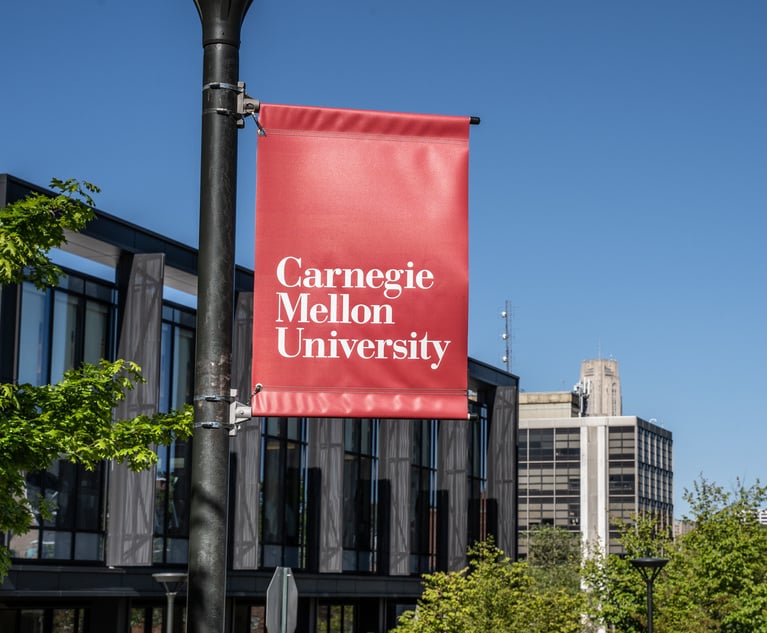The Problem With Compensatory Education as an IDEA Remedy And the Solution
Compensatory education is by far the most common remedy for children who are denied FAPE. But the way compensatory education is distributed is often rife with delays and unexpected denials so that the compensatory education fund can become merely "monopoly money."
March 18, 2020 at 12:43 PM
10 minute read
 Heather Hulit, Berney & Sang
Heather Hulit, Berney & SangThe Individuals with Disabilities Education Act (IDEA) is a federal law that requires local school districts and charter schools (schools) to provide a free and appropriate public education (FAPE) to children with special education needs. When schools fail to provide these children with FAPE, parents may file an administrative complaint seeking relief for those IDEA violations. Compensatory education is by far the most common remedy for children who are denied FAPE. But the way compensatory education is distributed is often rife with delays and unexpected denials so that the compensatory education fund can become merely "monopoly money." Besides the negative impact this has on children, it also limits the capacity of special education litigation to deter schools from violating students' rights. There is a simple solution to this problem—third-party trusts.
What Is Compensatory Education?
Compensatory education is a fund of money that a school makes available to children with disabilities to remedy a school's violations of the child's legal rights under the IDEA. Parents can use the compensatory education for education-related services for their child. It is not a remedy prescribed by the IDEA, rather, it is a judicially created remedy that is intended to replace the educational services that students with qualifying disabilities should have received from their schools. It is intended to put these students in the position they would have been in, but for the school's violations of their rights.
Here is an example of how it is supposed to work: if parents have a compensatory education fund for their child and want to hire a weekly tutor through a tutoring agency, they send the contract for services to the school and the school pays the provider directly. Or, if parents paid for the service out-of-pocket, they send proof of payment to the school for reimbursement. When compensatory education is provided through a settlement agreement or order of the tribunal, then that agreement or order will typically specify the services that the compensatory education can be used for.
Why Compensatory Education Is an Inadequate Remedy
But schools have incentives to delay and deny payments out of the fund. There are two aspects of compensatory education that contribute to this incentive. First, unlike a trust, compensatory education funds are not set aside for each child. Imagine, for instance, that a charter school has settlement agreements for compensatory education for ten students in the amount of $50,000 each. The charter school does not set aside $50,000 for each student from its operating budget. Rather, the charter school pays expenses, at least theoretically, as requests for payment come in. This is why schools may be less inclined to agree for private school tuition to be a permissible use of compensatory education funds—they do not want a large payment coming out of compensatory education all at one time. Second, for compensatory education funds created through settlement agreements, schools frequently insist upon a date after which the funds revert back to the school. As a result, schools have an interest in the parent not using the funds. It is akin to a contingent beneficiary acting as a trustee for the primary beneficiary. The administrators of these funds are not neutral, rather, it is a "win" for the school if a parent does not use the compensatory education by the reversion date.
Besides a lack of neutrality, many schools also do not have expertise and time to effectively administer these funds. While in larger school districts, like Philadelphia, there may be a special unit whose sole purpose is to administer compensatory education funds, usually it is the director of special education who directly handles requests for compensatory education payments from parents. This means that—on top of all of their other duties, like ensuring that students with disabilities receive an appropriate education—special education directors are also managing payment requests from parents of children with compensatory education funds. Consider what this means. Every time a request for reimbursement is made, the special education director has to check to see how much that parent has left in their compensatory education fund and then check to see if the requested use is permitted by the settlement agreement or court order. They are interpreting legal contracts and orders, a task for which they are neither trained nor well positioned to undertake.
Here are two recent examples, from two different school districts, of how parents were blocked from using their compensatory education funds. A parent filed an action against a school district for failing to identify his child with dyslexia, causing him to fall several grades behind. An administrative hearing officer awarded the child $80,000 in compensatory education. The parent identified a summer program designed to build reading skills in children with dyslexia and emailed the district's special education director about using his child's compensatory education for the program. After a week with no response, the parent emailed again, advising the special education director that the deadline for the deposit was three weeks away. By the time the special education director responded, the registration deadline for the camp had passed and the student was unable to go because parent could not afford to advance the funds. Whether it was disincentives or inadequate capacity, the district administrator prevented the compensatory education from fulfilling its purpose. In another case, a parent filed an action due to the district's inappropriate placement of her child. The parties settled the case for $60,000 in compensatory education and agreed that one of the permissible uses would be a computer for the student. A week after the agreement was signed, the parent emailed the special education director a link to a computer she identified for her daughter and asked the district to use compensatory education funds to purchase it. The special education director—a non-lawyer—reviewed the settlement agreement and concluded that the parent had not shown an "obligation to pay," and denied the request. The parent could not afford to purchase the computer directly, and the expense of suing for the breach exceeded the value of the computer. Again, the district thwarted the purpose of the compensatory education.
Implications
If schools can effectively prevent parents from using compensatory education funds, then there are several larger implications for the efficacy of the IDEA to provide relief to students, incentivize legal compliance by schools, and ensure that the rights of low-income students are as protected as those of their wealthier peers.
First, because the purpose of compensatory education is to put a student back where she would be, but for the IDEA violation, that student is still being denied FAPE when she is not receiving the remedy ordered or agreed upon by the parties. If the compensatory education is not used, then that student continues to be handicapped in her educational progress due to the underlying IDEA violation and falls further behind. Additionally, there is no practical redress for a parent who is being wrongfully denied access to her child's compensatory education fund. If a parent sues the school over its failure to grant appropriate compensatory education requests, an older child could easily graduate before the matter is ever adjudicated.
Second, since schools do not actually have to set aside money for each compensatory education fund, the financial impact and the deterrence effect of each lawsuit is limited. The purpose of laws like the IDEA and the Americans with Disabilities Act, is not just to give causes of actions to harmed parties, but also to send a message to covered entities about how to act in order to prevent being sued. If special education lawsuits do not cause any pain because schools can circumvent remedies, then schools are free to apply a cost-benefit analysis to how they treat our students with disabilities. Ultimately, they may decide that it's cheaper to discriminate against students with disabilities than to adequately accommodate and program for them.
Third, low-income parents and students suffer far more than their wealthier counterparts from denials and delays of their compensatory education reimbursement requests. A wealthy parent, for instance, might be able to front a few thousand dollars for a summer tutoring program and deal with a delay in reimbursement so that her child can still attend the program. On the other hand, a low-income parent frequently does not have the ability to advance that money and then wait two to three months to get it back. For them, a delay or a denial is not just frustrating, it means that their student cannot receive the educational benefit the compensatory education is supposed to provide and certainly does not put the student back into the position she would have been in, but for the IDEA violation.
A Simple Solution
When a school places compensatory education funds in a trust, we do not see any of the problems described earlier. Why? Because the incentives to delay and deny requests do not exist when there is a neutral trustee. Additionally, unlike special education directors, trustees have the expertise and time to interpret trust agreements and administer the funds. Admittedly, some schools will agree to place the equivalent monetary value of the compensatory education in a third-party trust, but some, including larger school districts like the School District of Philadelphia, will not.
Schools often argue that tribunals lack the authority to order educational trusts because damage awards are not available under the IDEA. While the words "special education trust" appear nowhere in the IDEA, neither do the words "compensatory education." Both, I submit, are equally available as remedies for adjudicators at special education hearings because both are forms of equitable relief.
The IDEA permits courts to "grant such relief as the court determines is appropriate," see 20 U.S.C. Section 1415(i)(2)(C)(iii). The U.S. Supreme Court held that this grants "broad discretion on the court" to fashion an appropriate remedy. While several courts in the U.S. Court of Appeals for the Third Circuit have ordered or affirmed the creation of trusts to compensate children for violations of their rights, hearing officers are reluctant to follow suit. But tribunals have an obligation to exercise their significant discretion to most fully effectuate the purposes of the IDEA.
Conclusion
The IDEA's purposes are most achieved through awards of educational trusts rather than compensatory education managed by the offending schools because parents will have easier access to the funds in order to remedy the harm done to their children by the IDEA violations and because ordering trusts will motivate school to make greater effort to preventing suits rather than just managing them through compensatory education. For that reason, I hope that tribunals will start moving toward awarding compensatory education in the form of a third party trust.
Heather J. Hulit, an associate at Berney & Sang, focuses her practice on education law. She earned her J.D. at Temple University Beasley School of Law in 2012. After graduating, Hulit joined the Philadelphia Defender Association as a child advocate attorney, representing youth in dependency proceedings. Contact her at [email protected].
This content has been archived. It is available through our partners, LexisNexis® and Bloomberg Law.
To view this content, please continue to their sites.
Not a Lexis Subscriber?
Subscribe Now
Not a Bloomberg Law Subscriber?
Subscribe Now
NOT FOR REPRINT
© 2025 ALM Global, LLC, All Rights Reserved. Request academic re-use from www.copyright.com. All other uses, submit a request to [email protected]. For more information visit Asset & Logo Licensing.
You Might Like
View All
LSAT Administrator Sues to Block AI Tutor From Using ‘Famous, Distinctive’ Test Prep Materials
3 minute read
Disjunctive 'Severe or Pervasive' Standard Applies to Discrimination Claims Against University, Judge Rules
5 minute read
From 'Confusing Labyrinth' to Speeding 'Roller Coaster': Uncertainty Reigns in Title IX as Litigators Await Second Trump Admin
6 minute readTrending Stories
Who Got The Work
J. Brugh Lower of Gibbons has entered an appearance for industrial equipment supplier Devco Corporation in a pending trademark infringement lawsuit. The suit, accusing the defendant of selling knock-off Graco products, was filed Dec. 18 in New Jersey District Court by Rivkin Radler on behalf of Graco Inc. and Graco Minnesota. The case, assigned to U.S. District Judge Zahid N. Quraishi, is 3:24-cv-11294, Graco Inc. et al v. Devco Corporation.
Who Got The Work
Rebecca Maller-Stein and Kent A. Yalowitz of Arnold & Porter Kaye Scholer have entered their appearances for Hanaco Venture Capital and its executives, Lior Prosor and David Frankel, in a pending securities lawsuit. The action, filed on Dec. 24 in New York Southern District Court by Zell, Aron & Co. on behalf of Goldeneye Advisors, accuses the defendants of negligently and fraudulently managing the plaintiff's $1 million investment. The case, assigned to U.S. District Judge Vernon S. Broderick, is 1:24-cv-09918, Goldeneye Advisors, LLC v. Hanaco Venture Capital, Ltd. et al.
Who Got The Work
Attorneys from A&O Shearman has stepped in as defense counsel for Toronto-Dominion Bank and other defendants in a pending securities class action. The suit, filed Dec. 11 in New York Southern District Court by Bleichmar Fonti & Auld, accuses the defendants of concealing the bank's 'pervasive' deficiencies in regards to its compliance with the Bank Secrecy Act and the quality of its anti-money laundering controls. The case, assigned to U.S. District Judge Arun Subramanian, is 1:24-cv-09445, Gonzalez v. The Toronto-Dominion Bank et al.
Who Got The Work
Crown Castle International, a Pennsylvania company providing shared communications infrastructure, has turned to Luke D. Wolf of Gordon Rees Scully Mansukhani to fend off a pending breach-of-contract lawsuit. The court action, filed Nov. 25 in Michigan Eastern District Court by Hooper Hathaway PC on behalf of The Town Residences LLC, accuses Crown Castle of failing to transfer approximately $30,000 in utility payments from T-Mobile in breach of a roof-top lease and assignment agreement. The case, assigned to U.S. District Judge Susan K. Declercq, is 2:24-cv-13131, The Town Residences LLC v. T-Mobile US, Inc. et al.
Who Got The Work
Wilfred P. Coronato and Daniel M. Schwartz of McCarter & English have stepped in as defense counsel to Electrolux Home Products Inc. in a pending product liability lawsuit. The court action, filed Nov. 26 in New York Eastern District Court by Poulos Lopiccolo PC and Nagel Rice LLP on behalf of David Stern, alleges that the defendant's refrigerators’ drawers and shelving repeatedly break and fall apart within months after purchase. The case, assigned to U.S. District Judge Joan M. Azrack, is 2:24-cv-08204, Stern v. Electrolux Home Products, Inc.
Featured Firms
Law Offices of Gary Martin Hays & Associates, P.C.
(470) 294-1674
Law Offices of Mark E. Salomone
(857) 444-6468
Smith & Hassler
(713) 739-1250






